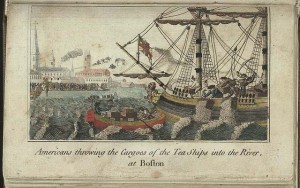Today in History: Tea Act passed by British Parliament (1773)
 Cronyism at its finest! On this day in 1773, the British Parliament passed the Tea Act, once again lowering the taxes paid by the now-failing East India Company and giving it a de-facto monopoly on the market in the American colonies (since all tea had to come through Britain first). Americans continued to purchase illegal (smuggled) tea at higher prices to the surprise of many British policy makers and loudly decried the cheap tea for the tax tyranny it represented. In particular, they noted that taxes on tea entering America directly were retained despite this tax break for those in England and — specifically — for customers of the East India Company.
Cronyism at its finest! On this day in 1773, the British Parliament passed the Tea Act, once again lowering the taxes paid by the now-failing East India Company and giving it a de-facto monopoly on the market in the American colonies (since all tea had to come through Britain first). Americans continued to purchase illegal (smuggled) tea at higher prices to the surprise of many British policy makers and loudly decried the cheap tea for the tax tyranny it represented. In particular, they noted that taxes on tea entering America directly were retained despite this tax break for those in England and — specifically — for customers of the East India Company.
In just a few short months, the anger bubbled over into the direct action we now remember as the “Boston Tea Party.†Three tea ships carrying East India Company tea, the Dartmouth, the Eleanor and the Beaver, were docked in Boston Harbor ready to unload. But the colonists demanded that the tea be returned to England and, after Massachusetts Governor Thomas Hutchinson refused to send back the cargo, Samuel Adams and the Sons of Liberty set to work. On December 16, they boarded the British ships disguised as Mohawk Indians and dumped the tea chests (worth nearly $1 million in today’s money) into the water. While this “Tea Party†is what stands out in memory, the history of the Tea Act itself holds an important piece of this puzzle: the colonists weren’t protesting higher taxes per se, but rather the British Parliament’s refusal to give them a say in decision making about those taxes and the blatant and costly favoritism being shown to the East India Company.